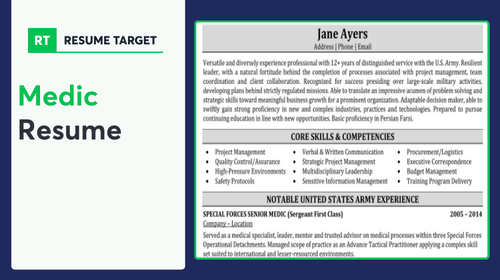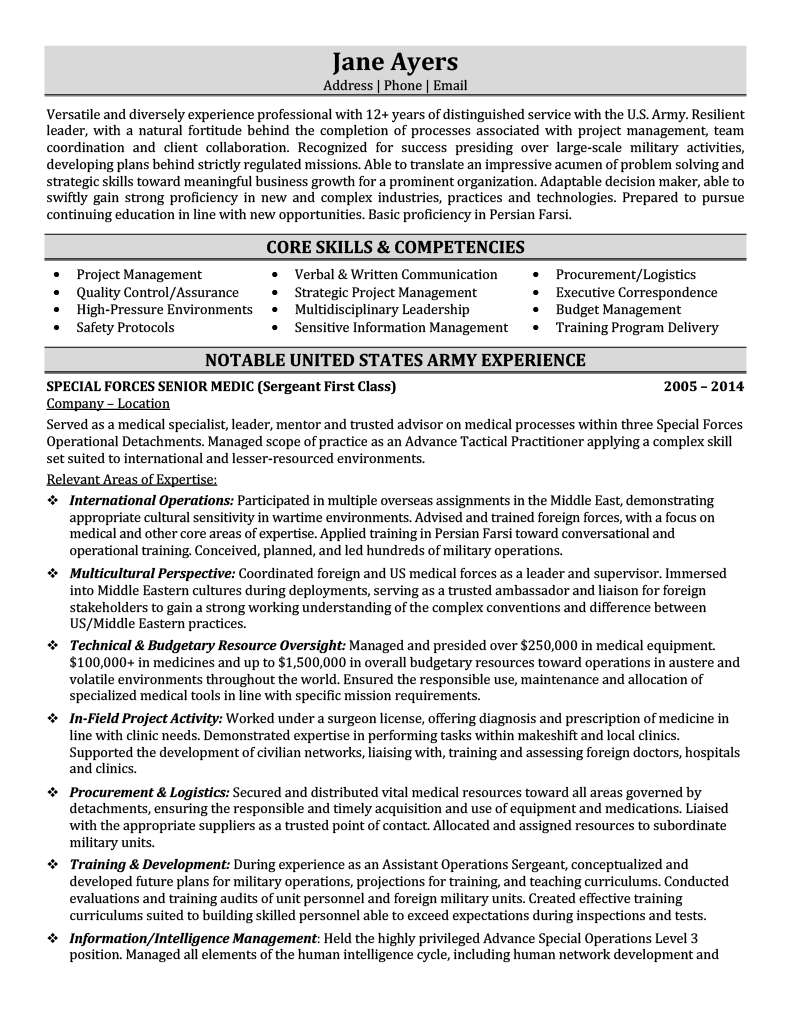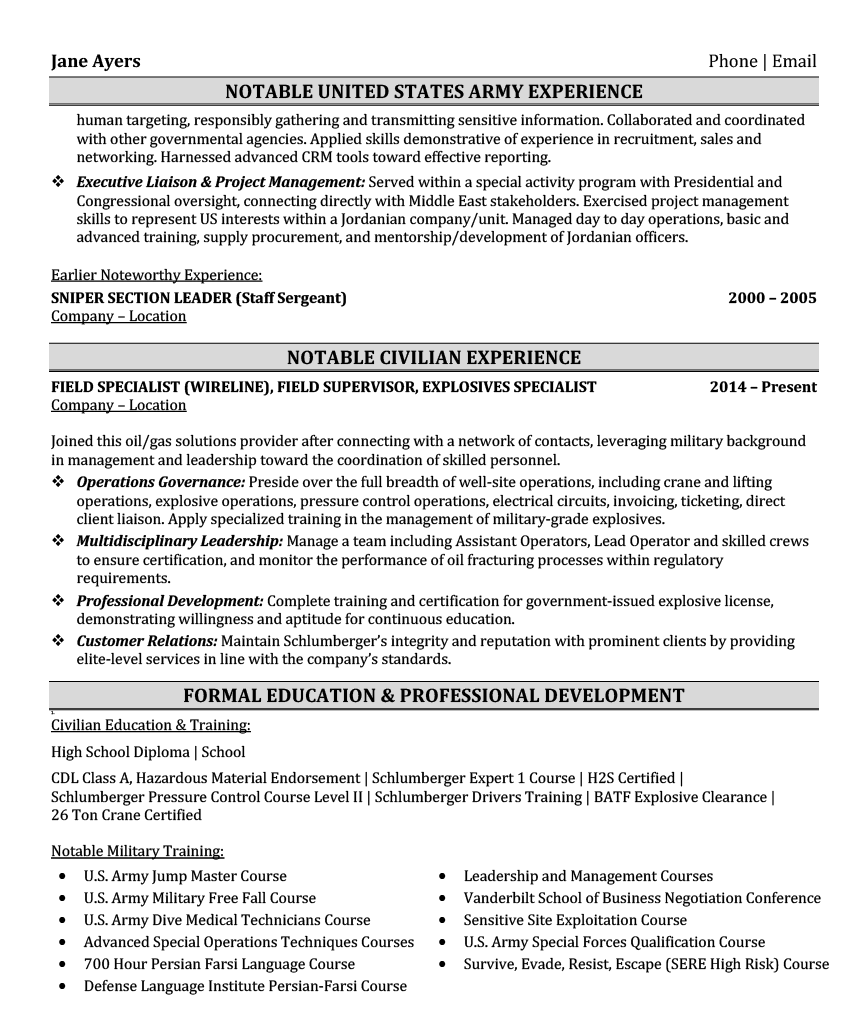

Translating battlefield medical experience into civilian terms can feel like learning a new language. Your life-saving skills are exceptional, but explaining them to civilian employers requires a different approach.
Are you struggling to make hiring managers understand your unique capabilities? Your combat medic experience is incredibly valuable, but you need the right words to bridge the military-civilian divide and showcase your transferable skills.
Resume Target specializes in helping combat medics transition to civilian healthcare roles. We know how to translate your military medical expertise into language that civilian employers understand and value, positioning you for the interviews you deserve.


When bullets fly and lives hang in the balance, combat medics serve as the vital link between battlefield trauma and survival, providing critical field medical care in both combat and humanitarian situations.
These highly-trained medical professionals must master a unique combination of tactical combat skills and emergency medical expertise, allowing them to treat everything from traumatic injuries to routine health concerns while potentially under enemy fire or in austere conditions.
If you're considering this challenging yet rewarding career path, you'll find that combat medics can advance through various specialized roles, from leading medical training programs to serving in elite special operations units, all while developing invaluable leadership and medical skills that translate to civilian healthcare careers.
Let's talk about the exciting earning potential in the Combat Medic field! Your career as a Combat Medic can offer both rewarding work and substantial compensation, with opportunities to significantly increase your earnings as you gain experience and expertise in this critical healthcare role.
Figures from: Talent.com
Combat Medics can advance from field operations to leadership positions in military healthcare. Your progression path includes opportunities in combat units, clinical settings, and training roles.
Beyond basic medical training, advancing your Combat Medic career requires mastering both technical expertise and leadership capabilities.
- Advanced trauma care and emergency response - Medical equipment operation and maintenance - Battlefield medicine protocols - Crisis management and decision-making under pressure - Team leadership and personnel training - Emergency triage coordinationTo launch your Combat Medic career, you can start by completing EMT certification and military enlistment, then pursuing specialized combat medical training through military programs.
Before diving into combat medicine, you'll need to develop essential skills including trauma first-aid care, IV placement, and medical documentation, which you can gain through entry-level healthcare positions and military training.
Requirements from Army Medical Center of Excellence
From Vermont's 213 openings to Texas's growing demand, Combat Medics find roles across government and healthcare sectors.
Figures from Zippia
Struggling to translate your intense military medical experience into civilian terms that hiring managers will understand? This comprehensive, section-by-section guide will help you create a powerful combat medic resume that effectively communicates your life-saving skills, emergency response expertise, and leadership abilities to potential employers.
As a Combat Medic who's mastered high-stakes medical care under extreme pressure, putting your incredible skills into words on paper can feel surprisingly challenging.
While you excel at rapid patient assessment, emergency trauma care, and battlefield medicine, translating these life-saving abilities into compelling resume language that resonates with civilian healthcare employers requires a strategic approach.
How would you characterize your blend of emergency medical expertise and military operational experience in a way that showcases your unique value to civilian healthcare organizations?
Reason: This helps frame your military medical experience in terms civilian employers can relate to, while emphasizing the distinctive combination of skills that sets combat medics apart from traditional healthcare providers.
What aspects of your combat medical training and field experience best demonstrate your ability to perform under extreme pressure while maintaining precision and protocol adherence?
Reason: This question helps articulate your capacity to handle high-stress medical situations, which is highly valued in both military and civilian emergency medicine settings.
How have your leadership responsibilities in coordinating medical response teams and training others shaped your approach to emergency healthcare delivery?
Reason: This helps highlight your broader organizational and leadership capabilities while demonstrating your ability to contribute beyond direct patient care roles.
As a Combat Medic, your skills section needs to demonstrate both your emergency medical expertise and your military operational capabilities, from trauma care and casualty evacuation to tactical field operations.
Your resume should showcase both advanced life-saving procedures like hemorrhage control and needle decompression, alongside essential military skills such as weapons proficiency and battlefield communications.
Showcase your life-saving expertise by organizing your combat medical experience into three powerful sections: a high-level role overview that establishes your battlefield context, measurable achievements that highlight lives saved and medical procedures performed, and core responsibilities that demonstrate your tactical medical proficiency.
Combat Medics often struggle to translate their high-stakes battlefield experience into civilian-friendly terms that hiring managers can understand. Transform your military medical expertise into powerful achievements by connecting your life-saving interventions and emergency response capabilities to measurable outcomes in patient care, team leadership, and medical readiness.
Combat Medics perform critical life-saving duties that extend far beyond basic first aid. Your responsibilities section must clearly demonstrate both your tactical medical expertise and your ability to perform under extreme pressure, showing how your skills directly impact mission success and unit readiness.
As a Combat Medic, your medical certifications and military training form the backbone of your credentials. Focus on highlighting your most current medical qualifications and specialized combat medical training, especially those that translate well to civilian healthcare roles.
Now that you've built a strong foundation using Resume Target's proven resume writing guidelines, you're ready to transform your military medical experience into a powerful career tool.
While many combat medics focus solely on customizing their cover letters, tailoring your actual resume for each position is crucial for showcasing your specific battlefield medicine, trauma care, and emergency response capabilities.
A customized combat medic resume not only helps you clear ATS screening by incorporating key medical and military terminology, but it also demonstrates to hiring managers how your unique combination of tactical medical skills and leadership experience aligns perfectly with their organization's needs.
Ready to make your combat medic resume your secret weapon? Let's transform your service experience into your next career victory!
Don't let a lack of battlefield experience hold you back - your dedication to emergency medical care and military service can shine through on your resume.
Instead of dwelling on civilian work history, focus on highlighting your medical training, physical fitness achievements, and any emergency response or first aid certifications you've earned.
Your combat medic resume should emphasize your medical knowledge, tactical skills, and ability to perform under pressure.
For more guidance on structuring your military medical resume, check out the Student Resume Writing Guide to ensure you're presenting your qualifications effectively.
Your military medical training and hands-on experience during exercises are powerful assets that deserve to be showcased front and center in your resume summary.
Focus on highlighting your emergency response capabilities, leadership training, and the high-stakes nature of your medical preparation to demonstrate your readiness for this critical role.
"Dedicated and highly-trained Combat Medic with intensive military medical preparation and hands-on experience in emergency response scenarios. Completed 16 weeks of specialized combat medical training with certification in trauma care, field medicine, and tactical casualty management. Demonstrated excellence in high-pressure medical simulations and field exercises, maintaining 100% accuracy in patient assessment protocols. Seeking to leverage strong medical skills and military discipline to provide life-saving care in combat environments while supporting mission readiness."
Now's your chance to showcase the intensive medical training and specialized certifications that make you a qualified combat medic - let your education section tell the story of your expertise!
Don't just list your EMT certification - highlight relevant coursework like trauma response and battlefield medicine, plus include hands-on training scenarios that demonstrate your ability to perform under pressure, like mass casualty exercises or combat simulation drills.
1. What are the names of courses common to a degree/certification for Combat Medics? Extracted Information: The Combat Medic Specialist Training Course (CMSTC) is a 16-week course that includes Emergency Medical Technician (EMT) Phase, and Whiskey Phase [1]. Source URL: [https://www.metc.mil/Academics/Courses/Combat-Medic-Specialist-Training-Course/](https://www.metc.mil/Academics/Courses/Combat-Medic-Specialist-Training-Course/) [1]Relevant Coursework: Emergency Medical Technician Training | Tactical Combat Casualty Care | Advanced Trauma Management | Field Sanitation and Preventive Medicine | Combat Wound Treatment | Emergency Pharmacology
Key Projects:
Mass Casualty Response Simulation: Led a team through a complex multi-casualty scenario requiring rapid triage and treatment of simulated combat injuries under high-stress conditions.
Field Medical Operations Exercise: Participated in a two-week field training exercise focusing on tactical medical support and emergency response in simulated combat conditions.
Leverage your military medical training, certification coursework, and hands-on emergency response experience to create a powerful skills section that showcases your readiness for high-stakes medical situations.
As an entry-level Combat Medic, your unique combination of medical expertise and tactical skills positions you perfectly for roles in military healthcare, emergency response, or civilian medical settings, with excellent opportunities for career advancement through additional certifications and specializations.
Translating your intense military medical experience into civilian terms can feel like speaking two different languages - you know you've saved lives and managed high-pressure situations, but putting that into words that civilian employers understand is a whole different battle.
At Resume Target, we specialize in helping military medical professionals bridge the gap between service and civilian healthcare careers, having successfully guided hundreds of combat medics through this exact transition.
Our deep understanding of both military medical protocols and civilian healthcare requirements means we can showcase your exceptional skills in terms that civilian employers value.
With healthcare facilities actively seeking professionals with your unique combination of medical expertise and grace under pressure, now is the perfect time to transform your military experience into a powerful civilian resume - let's get started with a free consultation today.
Impress any hiring manager with our Military resume writing service. We work with all career levels and types of Military professionals.
Learn More → Military Resume Writing Services